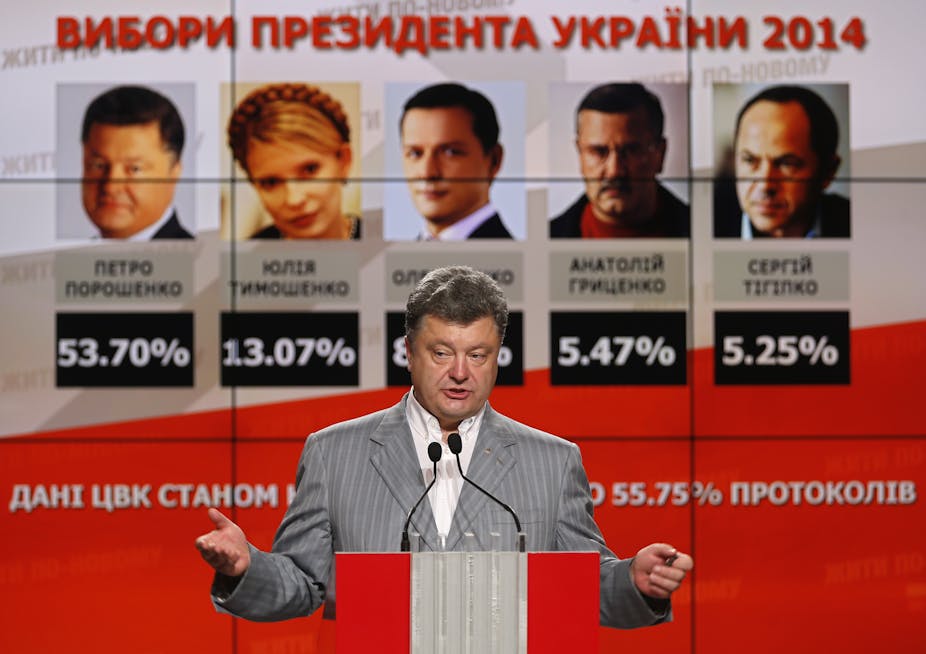With the outright victory of Petro Poroshenko in Ukraine’s presidential elections on May 25 now confirmed, hopes are running high for a new beginning that will deliver a swift way out of a protracted crisis.
There were clearly some positive signs in the run-up to Sunday’s polls. Presidential candidates were stressing the need for unity and dialogue. Ukraine’s richest man, Rinat Akhmetov, a powerful tycoon based in eastern Ukraine, took a strong public stance against separatists there. An international election observer mission was in place. And Russian president, Vladimir Putin, had promised to recognise the results and (yet again) withdraw Russian troops from Ukraine’s borders.
Now, the Russian foreign minister, Sergey Lavrov confirmed his country’s recognition of the results and indicated a readiness to enter into talks with Poroshenko, but warned against a continuation of Kiev’s “anti-terrorist operation”. In one sense, expectations of a new beginning for Ukraine may thus appear quite justified.
At the same time, however, Russia retains control of Crimea, annexed at the end of March. In the course of the crisis, Moscow also massed some 40,000 troops on Ukraine’s eastern border, while well-armed separatists gained control in parts of the eastern regions of Donetsk and Luhansk and held a referendum in the hope of following in Crimea’s wake.
Unrest has spread further across Ukraine, including to Odessa where dozens of people were killed following violent clashes between pro-Ukrainian and pro-Russian demonstrators. Even the week immediately before the elections saw high levels of violence, with numerous casualties as a result of clashes between Ukrainian security forces and separatists.
Uphill task
Yet, the question is what difference the election of Poroshenko will make to Ukraine and Ukrainians. Poroshenko, known widely as “chocolate king” for his business success, has political and government experience as well, having been a member of both Yanukovich’s Party of the Regions and Yushchenko’s Our Ukraine bloc and having served as foreign minister during Yulia Tymoshenko’s premiership.
Though he may be popular at the moment because of the general disillusionment that voters feel with the current political elite in Kiev, he does not have his own political party. Neither has he so far articulated a clear vision for the future, a plan for reform or a set of policies to bring Ukraine out of its current crisis. It will be difficult for him to manage the deeply fractious political process in light of a severe economic crisis and the continuing spectre of intensifying civil war.
The difficulties he faces in trying to deliver on Ukrainians’ expectations for real and sustainable change are further compounded by the current constitution, under which most power is vested in the parliament where Poroshenko has yet to build a reliable support base. This may change by the end of the year, but only if he manages to build a strong network of local political support across Ukraine ahead of new parliamentary elections and if he can sustain his current popularity.
East still riven by violence
The other big challenge for the new president will be the situation in eastern Ukraine. One immediate issue will be legitimacy. Regardless of the endorsement of elections by the OSCE, EU, US, and even Russia, the winning candidate is unlikely to have received any votes in Ukraine’s eastern flashpoints. The central government did not manage to distribute ballot papers in Donetsk, Lukhansk and many other cities of eastern Ukraine.

The day after Poroshenko’s electoral victory, separatists in Donetsk tried to take over the city’s international airport. And while Poroshenko called for talks including with Russia he also ruled out negotiations with “bandits”.
Even though it is unclear whether local elites in the east have any clear plan for their next moves, they remain a force to be reckoned with and capable of thwarting any immediate de-escalation. Any progress will require Moscow’s support. While the Kremlin, at present, appears reluctant to incorporate the Donetsk and Luhansk regions, this is not the same as active encouragement from Russia for the separatists to stop their campaign of creating instability across the two regions of Donetsk and Luhansk.
In fact, continuing instability in the east may serve several constituencies well. For the separatists it could work as a short-term strategy to position themselves for an eventual bargaining process among Ukrainian oligarchs over the redistribution of the really big and attractive “cake” left behind by ousted president, Victor Yanukovych. For Russia, too, instability could be a significant bargaining chip in any negotiations, not least because this cake remains attractive to powerful players there as well.
At the same time, we must not forget that the EU and US, too, have their share of responsibility for the crisis in Ukraine. At some level, Ukraine is, after all, the battleground of a geopolitical competition between Russia and the West. It cannot be won in a traditional sense by either side, and compromises will be necessary within Ukraine and beyond.
Poroshenko may be the president that Ukraine needs at this critical time – he has worked with both the pro-European and the pro-Russian political camps in the past and may be able to bridge the deep divide within Ukraine and be a credible partner to both Russia and the West. Yet, in order to deliver on the promise that his presidency at this moment still holds, he will need support to resolve the country’s political and security crisis and to stabilise its economy. Unless he can demonstrate visible progress on either front soon, voters will soon be as disappointed with him as they remain with most of the country’s current political elite.
This is an updated version of a story that appeared on May 25.

